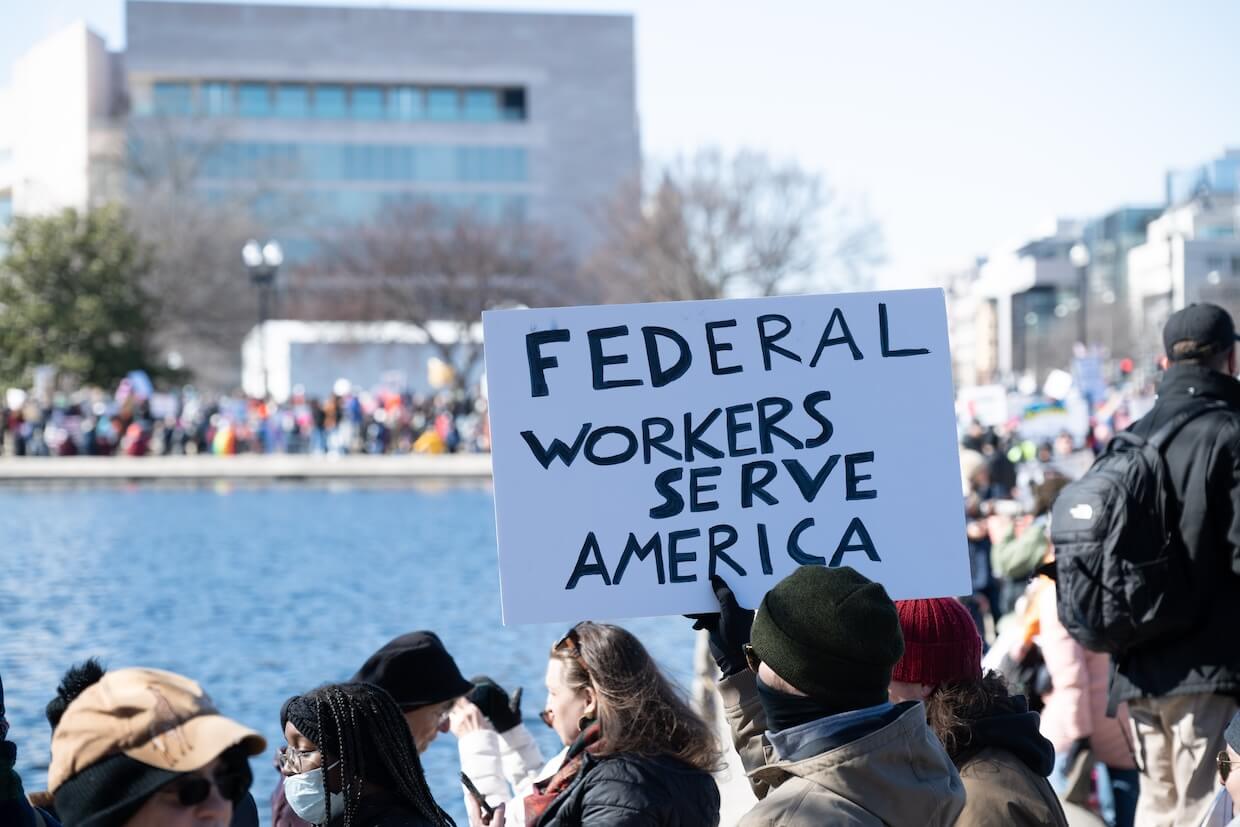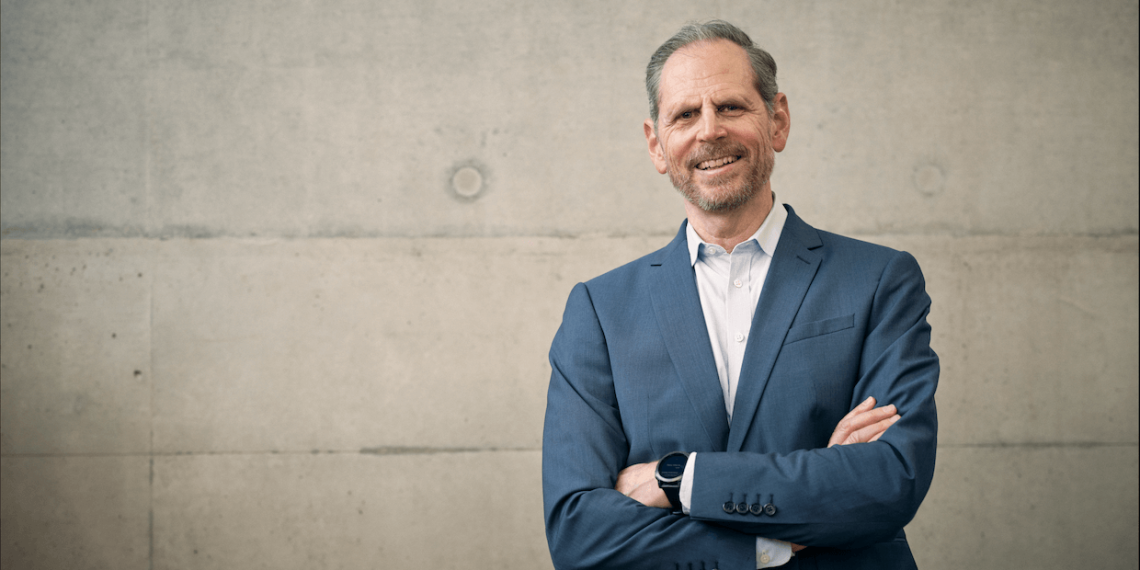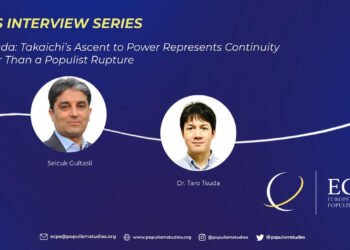In a time of rising populism, Professor Eric Beinhocker explains how populist leaders capitalize on economic grievances and social distrust to fuel their movements. “When people feel the system is unfair and rigged, they seek someone to blame,” he says, pointing out how populists exploit feelings of broken social contracts to gain political traction. According to him, trade wars and economic nationalism further exacerbate global instability. “No country can make an iPhone alone,” Professor Beinhocker states, stressing that interconnected supply chains make protectionism self-destructive. Tariffs and trade barriers, he warns, will “lower living standards and harm American competitiveness” rather than protect workers. This insightful discussion unpacks the economic forces fueling populism and the fragility of global trade.
Interview by Selcuk Gultasli
In an era of rising political polarization and populist movements across the globe, the erosion of trust in institutions has become a defining challenge for democracies. In an intriguing interview with the European Center for Populism Studies (ECPS), Dr. Eric Beinhocker, Executive Director of INET Oxford and Professor of Public Policy Practice at the Blavatnik School of Government, University of Oxford, discusses how populist politicians leverage the breakdown of the social contract to fuel political movements. He introduces the concept of the “psychology of broken contracts” as a key factor in the rise of populism, arguing that when people perceive a fundamental violation of fairness, “some of our strongest emotions arise from fairness violations,” leading to anger, resentment, and a desire to strike back—a phenomenon that populist leaders exploit.
According to Professor Beinhocker, the modern economy has undergone major shifts since the 1970s, particularly in Western democracies, where working-class citizens and those outside major metropolitan centers increasingly feel “the system isn’t working for them—that it is unfair, rigged, and benefits others at their expense.” He argues that these perceived injustices—whether economic or political—create fertile ground for populist rhetoric, which provides “a clear enemy,” often framed as elites, immigrants, or individuals outside of one’s identity group. Populist politicians, he explains, thrive on these grievances, “preying on and exploiting the psychology of broken contracts to gain political traction.”
A crucial factor accelerating this process, Professor Beinhocker contends, is the role of social media. While he does not see it as the primary cause of populism, he acknowledges its role in intensifying moral outrage. “Social media algorithms quickly identify that the content generating the most engagement is that which triggers moral outrage,” he explains, reinforcing tribal identities and making “resetting these emotions incredibly difficult.” Populist leaders capitalize on this dynamic, using divisive narratives to deepen distrust in institutions and erode democratic norms.
To counteract these trends, Professor Beinhocker suggests that restoring trust requires rebuilding fairness and re-establishing a strong social contract. He argues that past leadership, such as Franklin Roosevelt’s New Deal, demonstrated how governments can “reset the social contract” through economic reforms, symbolic policies, and direct engagement with public concerns. However, he warns that “merely talking about trust is not enough—people need to experience fairness and institutional accountability.”
This interview provides a thought-provoking analysis of the intersection between economic shifts, political trust, and the psychology of populism, offering essential insights for scholars, policymakers, and citizens alike.
Here is the transcription of the interview with Professor Eric Beinhocker with some edits.
Trust Erodes When the Social Contract Is Broken

Professor Beinhocker, thank you very much for joining our interview series. Let me start right away with the first question: In your article “Trust, Populism and the Psychology of Broken Contracts,” you argue that over the last few years, there has been a worrying decline in faith by the citizens of many countries that institutions, including government and the media, are doing what is right. Can you explain the reasons why trust in institutions has eroded?
Professor Eric Beinhocker: I think a good starting point is that our relationships with key institutions like employers and governments are not just economic in terms of costs and benefits, as economists often think of them, but also emotional.
We can think of people as having a social contract with these institutions. I contribute work to my employer, follow their rules and norms, and, in exchange, I receive pay, along with other benefits such as status, social connections, and security. So, there is a two-way deal—a contract between people and institutions.
When people feel that this deal has been broken or violated in some way—what I call the psychology of broken contracts—they perceive fairness as being violated. Some of our strongest emotions arise from fairness violations. Psychologists have shown that this response is deeply biophysical—hormones flood the brain and body, triggering feelings of anger, resentment, and a sense of being taken advantage of. This emotional response can even override rational, thoughtful parts of the brain. Research also shows that people will sometimes strike back in ways that harm themselves, simply to restore a sense of fairness. There is an evolutionary explanation for this: enforcing norms of group cooperation is essential for social stability.
My interpretation of the rise of populism is that it stems from this reaction. Over the past few decades—beginning as far back as the 1970s in the US and parts of Europe—we have seen major changes to the social contract. People’s sense of what they contribute to society versus what they receive in return, particularly among working-class citizens and those with less education, has been disrupted. Many people outside of the large, prosperous cities feel that the system is not working for them—that it is unfair, rigged, and benefits others at their expense.
Often, these “others” are defined as people outside one’s identity group—those of different ethnic or religious backgrounds, immigrants, or elites in big cities with different cultural values. Populist politicians have exploited and preyed on this psychology, using it to fuel their narratives and gain political traction.
What is the relationship between the rise of populism and the lack of trust in institutions?
Professor Eric Beinhocker: When you feel that fairness has been violated, when you feel that the terms of the deal you had have been broken, you lose trust. This is very corrosive, both economically and politically, because our economic and political systems run on trust. They rely on the cooperation of millions of strangers—non-family members—working together in organizations and institutions. If we don’t have trust and that cooperation breaks down, our ability to function effectively is eroded, whether in economic or political spheres.
I argue in my work that at the core of restoring trust is the need to restore fairness and balance. People need to see and feel that they are getting a fair deal and that their expectations are being met. If we look back to Franklin Roosevelt and the Great Depression in the US, I think he understood this psychology very well. The New Deal was an explicit effort to reset the social contract, recalibrate people’s expectations, and, through concrete actions and lived experiences, rebuild trust.
You can’t rebuild trust just by talking about it—although language does play an important role—but rather through what people actually experience.
Fairness Violations Fuel Populism and Tribal Politics

You argue that the ‘emotions of fairness violation’ may be playing a role in shaping politics and society today, which might be ‘the deeper and more universal explanation for the rise of populism,’ and add that highly emotional, seemingly irrational reactions have an underlying logic to them. Can you elaborate on this underlying logic?
Professor Eric Beinhocker: Well, first—and I’m sure you are studying this at the center—one striking thing about the rise of populism is how it has happened almost simultaneously across a number of quite different countries, economies, and even political systems. And even though the US and (Donald) Trump are getting a lot of attention today, this phenomenon has occurred in countries as diverse as India, Brazil, and Central European nations.
So, we have to ask: what are the more universal phenomena that might be driving this? This is where I come to an explanation at the intersection of economics, politics, and psychology, where changes in the economic and political environment have triggered these psychological reactions of fairness violation, which have then been easy prey for populist politicians.
Another universal phenomenon has been the change in the media landscape, particularly the rise of social media. While I don’t see it as a primary causal factor, it has clearly acted as an accelerant. When feelings of fairness violation occur, they trigger a form of moral outrage. Social media algorithms quickly identify that the content generating the most engagement is that which triggers moral outrage—it gets shared the most and garners the highest interaction, making it the most profitable. This creates a strong incentive for social media companies to fan the flames of these emotions.
Psychology research also shows that when people experience these emotions, it is very difficult to reset them. People literally stop listening when they are in this mode, and they tend to bond together tribally. If you feel wronged, or that someone has broken a deal with you, you become more powerful when you find others who feel the same way and work together to correct things.
To mitigate these responses and change the political landscape, political leaders first need to acknowledge these feelings and the realities behind them. In many center-left parties in the US and Europe, there has been a tendency to either tell people what is good for them or focus on issues that do not necessarily address their core concerns. Second, once these problems are acknowledged with empathy, leaders must credibly work on solutions to rebuild trust.
Populists Exploit Grievances to Deepen Identity-Based Divisions
Why do you think ‘identity-based tribalism’ and ‘inter-group conflict’ have increasingly gone up? Can you explain the link between the economic contract and the political contract and how the breakdown of these contracts plays into the hands of populists?
Professor Eric Beinhocker: As I mentioned, it’s a natural reaction. When people feel they are being treated unfairly by a system or that their trust has been violated, they look for people like them to team up with, strike back, avenge the harm, and try to reset the balance of the deal.
Social media has played an important role in helping people who feel this way find each other. The evidence I’ve seen suggests that many of the changes driving these feelings—such as shifts in employment, income levels, job security, and the role of the welfare state—have been affecting people for a long time. However, in the past, individuals may have felt these concerns in isolation. Someone might have worried about their job security, questioned whether their skills would remain relevant without a university education, or wondered whether their children would have opportunities in a declining area.
Previously, these concerns might have been personal and disconnected. But the internet has allowed people to find others experiencing the same anxieties, making them realize they are not alone. There is also a natural tendency to seek solidarity with those who share an identity group. For instance, white male working-class voters have been a prominent base of support for populists across multiple countries, as they have coalesced around shared grievances and a sense of being left behind. Populists have been highly skilled at linking these emotions with the need for identity and solidarity, capitalizing on the breakdown of both economic and political contracts.
You argue that when the social contract is broken, it is very hard to put the moral outrage genie back in the bottle, yet you give the example of the US as a successful case of containing social outrage. What should Europe do to combat the rise of far-right populism?
Professor Eric Beinhocker: I meant that the US historically, in the 1930s, was a successful case through Roosevelt and the New Deal. Whether it will be successful in putting the genie back in the bottle this time remains to be seen. Right now, the genie is very much out of the bottle in the US, and looking at all the results we’re seeing, the challenge is significant.
If we look at cases where social cohesion has been rebuilt, more research is needed because there have only been a few cases I’ve examined, and nothing systematic. However, what seems to happen is, first, leaders must express real empathy with the emotions involved—not deny them but acknowledge the real causes behind them and understand the people expressing them. Then, they need to outline a pragmatic path forward to restore fairness, rebuild the social contract, and address specific issues.
Sometimes, symbolic actions play a key role in demonstrating a commitment to recovery. For example, Roosevelt’s public works programs during the Great Depression, while large in scale, were not enough on their own to lift the country out of the depression. However, they had a huge symbolic impact in showing that Roosevelt and the government cared and were actively working to address these problems and restore people’s sense of mutual commitment with their government.
I think we need to think creatively about identifying the real underlying issues and what can practically be done to address them. However, the current environment presents a much greater challenge than Roosevelt’s time. The influence of social media has significantly eroded trust in basic ideas of truth and facts. That is a challenge we will need to figure out how to overcome.
The Clean Energy Transition Needs Global Cooperation and Capital

Many clean energy transitions are happening in wealthier nations, while developing countries struggle with financing. What global financial mechanisms or cooperation strategies can ensure a just and inclusive transition? Are we on track for a sustainable and inclusive green transition?
Professor Eric Beinhocker: These are very important questions. A colleague and I at Oxford recently published a piece in The Wall Street Journal arguing that the clean energy transition now has significant momentum, and that the economics and technology behind it are very promising. Even if Trump is re-elected and takes an anti-clean energy stance, he is unlikely to stop the transition entirely—he might slow it down in the US, but at a global level, clean energy technologies will continue to grow.
Despite the fact that these energy sources are now cheaper than fossil fuels in many cases and are getting even cheaper as technology improves, they remain highly capital-intensive. Wealthier countries are increasingly finding ways to mobilize capital to make these investments and accelerate the transition.
However, as you point out, access to capital remains a major issue in developing countries. The shift to clean energy in many of these nations would be highly beneficial both economically and environmentally, yet the capital needed to make this transition is not being mobilized, even though these investments would be positive over time.
For a long time, the proposed solution has been global-level action through the UN process, development banks, and aid agencies. However, this has been a slow and cumbersome political process, and developing countries argue—rightfully so—that the promised capital flows have not materialized. Given the current environment of low global cooperation, particularly with the political situation in the US, I am not optimistic that this will improve significantly in the near term.
That said, perhaps a "coalition of the willing" among certain countries could take steps to improve the situation. The best answer, in my view, is to find ways to attract private capital to these countries and projects. Governments and multilateral organizations can play a crucial role in de-risking private capital flows, and there are various mechanisms to do this. My hope is that as the economics of clean energy technologies continue to improve, we can lower some of the barriers that currently prevent private capital from seeing the opportunities for clean energy investment in developing countries.
Trump’s Trade Policies Could Disrupt Global Supply Chains and Undermine Climate Cooperation
With Trump previously withdrawing from the Paris Agreement, how will his return to office impact global cooperation on initiatives like the Breakthrough Agenda? Will he further undermine international climate agreements?
Professor Eric Beinhocker: It’s clearly not good for international cooperation on climate. But my sense, from talking to folks in that field, is that we made it through the last Trump administration on these issues. While his return may slow things down and cause harm in some areas, we will make it through again.
The US is an important player in these forums, but it is certainly not the only one. Other countries will need to find ways to keep the momentum going. The good news is that the economic and technological trends behind clean energy provide some tailwinds to support those efforts.
Given Trump’s second-term policies, how would a renewed "America First" approach impact global trade and climate initiatives, particularly in relation to tariffs on China, withdrawal from international agreements like the Paris Accord, and protectionist policies? How might these trade policies affect efforts like the Breakthrough Agenda, which aims to drive down clean energy costs?
Professor Eric Beinhocker: There was a piece by Tom Friedman in The New York Times several weeks ago where he interviewed me on Trump’s tariff plans. I think the part that hasn’t been discussed enough is that, of course, added tariffs increase costs and frictions on trade, reducing trade flows and raising costs for consumers—those are well-known effects. But what has been less appreciated in the analyses of the damage they will cause is just how interconnected global supply chains are.
It’s not like the old days, back in Adam Smith’s time, where one country makes wine, another makes cheese, and trade simply makes both better off. In the modern economy, I can’t even make the wine, and you can’t make the cheese without each other because so many inputs, machines, and supplies come from global supply chains. As I said in that article, no country on earth can make an iPhone alone. There’s probably no country that can make a modern jet aircraft, an automobile, or even many agricultural products without access to global supply chains.
Farmers today get their seeds from one country, fertilizer inputs from another, machinery from yet another, and so on. These trade wars and frictions may result in some restructuring of supply chains, but mostly, they will create difficulties in producing complex products, increase costs, and lower living standards for everyone. They will also severely hurt American competitiveness.
Trump believes that imposing these barriers will increase production in the US, but when you talk to the companies involved—like automakers—they will tell you they cannot operate in a country with these kinds of barriers. They rely on a global supply chain, and if they face trade restrictions, they will simply move production elsewhere to avoid these barriers. It seems quite unambiguous that these policies will be harmful—not just to the global economy, but significantly to US workers, consumers, and overall competitiveness.
Trump’s Tax Cuts Enriched the Wealthy While Exacerbating Inequality and Deficit

Your work discusses the need to rethink economic welfare. How might Trump’s tax cuts for corporations and de-regulation affect economic resilience, especially for those most vulnerable to climate change? Could Trump’s fiscal and monetary policies worsen economic inequality and climate vulnerability?
Professor Eric Beinhocker: On the question of the Trump tax cuts, which they are looking to extend in this current congressional session, we actually now have several years of evidence on what the first Trump tax cuts did to the economy. The findings from those analyses are quite clear—they did very little to spur actual investment in productive assets.
The money that corporations received from those tax cuts largely went into stock buybacks, which inflated stock prices and enriched shareholders and CEOs, further exacerbating inequality while doing very little for average people.
Additionally, the tax cuts massively increased the deficit—likely the largest non-wartime increase in the US deficit in history, if I am remembering correctly. It was essentially a huge giveaway to the wealthiest, with minimal benefits for everyone else. Given that evidence, we would expect a renewal of those tax cuts to produce a similar outcome.
At the same time, while cutting taxes for corporations and the wealthy, they are simultaneously slashing other parts of the government. As a result, Americans will see critical services they rely on—such as veterans’ services, healthcare, education, and infrastructure—deteriorate.
Some economists anticipate that the combination of these tax cuts, trade wars, and changes in fiscal policy could lead to a very problematic mix of inflationary pressures and economic stagnation for the US economy.
Global Economic Fragmentation Is the Most Likely Scenario for the Foreseeable Future
And lastly, Professor Beinhocker, trade tensions, economic nationalism, and supply chain disruptions have led to "de-globalization" discussions. Is globalization in decline, and what are the consequences? Do you see a permanent shift toward regional economic blocs, or will globalization find new forms?
Professor Eric Beinhocker: What I would like to see is a kind of smart globalization. I haven’t—I’ve been a critic of the 1980s and 1990s neoliberal model of globalization, which essentially threw open the doors and let the chips fall where they may. We have seen that this approach has produced very mixed results.
On the one hand, globalization has led to increased trade and investment worldwide, yielding many positive benefits, such as helping developing countries and lifting millions out of poverty, particularly in China and other parts of the world. On the other hand, it has also had negative impacts on workers in certain sectors and regions of the US, Europe, and elsewhere.
Moreover, we need to be realistic about the geopolitical and security risks associated with the type of globalization we have had. COVID-19 exposed the vulnerabilities of supply chains that rely too heavily on a single country or supplier. Additionally, geopolitical tensions present risks if, for example, the US is entirely dependent on critical technologies from certain countries.
I believe there is a middle ground between the neoliberal "throw open the doors" approach and the Trump-era strategy of raising trade barriers. We should seek the benefits of globalization and global supply chains while also being strategic about diversification and forming trade relationships with reliable partners.
Janet Yellen, Biden’s Treasury Secretary, gave an insightful speech on this topic, advocating for what she called "friend-shoring"—strengthening trade relationships with the US’s allies and partners. Additionally, trade policies should consider the interests of workers, environmental protections, and broader societal concerns, rather than solely prioritizing corporate profits.
There are smarter ways to approach trade, and the Biden administration was making steps in that direction. Unfortunately, that is not the trajectory we are currently on. In the near term, it seems inevitable that trade will become more fragmented into regional blocs.
I was just listening to a report on how China has responded to Trump’s tariffs by lowering trade barriers with a large group of developing countries, attempting to form its own trading bloc with nations across Asia and other regions. Unfortunately, this kind of economic fragmentation appears to be the most likely scenario for the foreseeable future.


